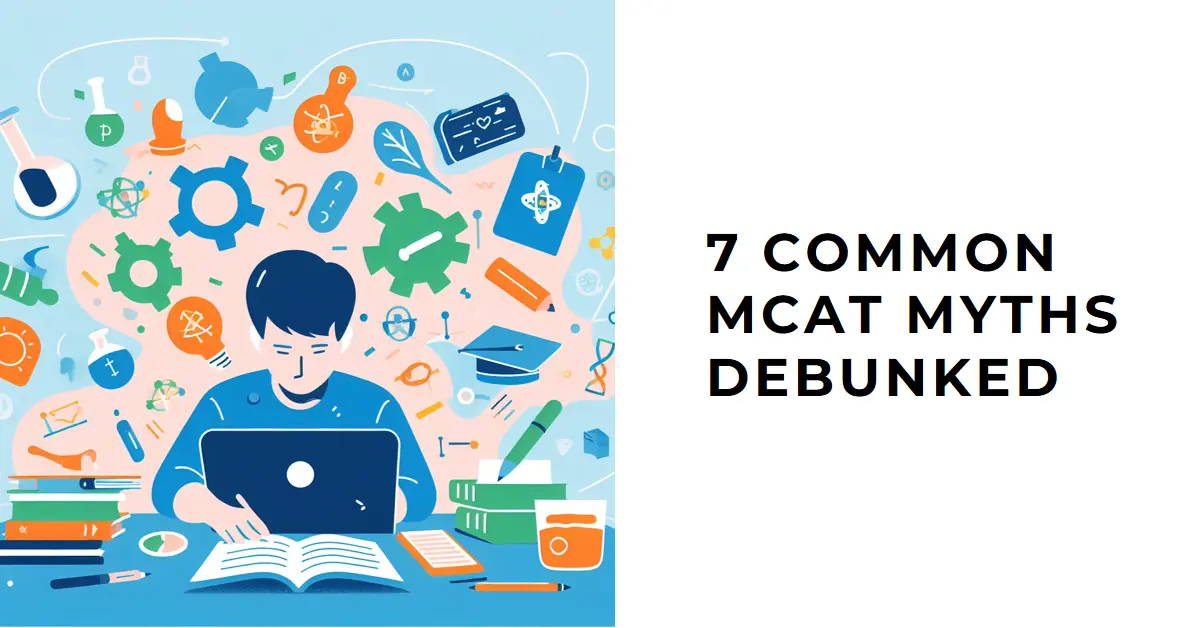There are many pieces of advice available to help you navigate the difficult terrain of MCAT preparation, some of which might mislead you. Here are seven popular MCAT fallacies that should be dispelled to help you remain on the right track and improve your score. You’ll be more prepared to start your MCAT journey with clarity and confidence if these myths are cleared out.
1. Myth: More Study Hours Guarantee Success
There’s a widespread notion that your chances of success increase with the number of hours you spend preparing for the MCAT. But the quality of your study sessions matters just as much as the amount of hours you put in, so make sure you go for the best MCAT prep course you can find. Memorizing for hours on end without comprehension won’t provide the best outcomes. Instead of obsessing about quantity, concentrate on focused, productive studies. Determine your areas of weakness, take deliberate action to strengthen them, and make sure you understand the underlying ideas.
2. Myth: Cramming Is the Key to Last-Minute Success
According to the myth of cramming, weeks of insufficient preparation can be made up for with a last-minute, intense study session. In actuality, cramming often results in surface-level memorizing rather than in-depth comprehension, making it a risky MCAT approach. Your ability to apply information from several areas is evaluated on the test; this is a talent that you have cultivated through regular, deliberate preparation. Cramming impairs your ability to think clearly throughout the test by raising tension and anxiety levels. For the duration of your preparation, make frequent, spaced repetition a habit rather than depending just on short-term recollection.
3. Myth: The MCAT Is Purely a Test of Knowledge
Although knowledge is clearly important for the MCAT, it would be a mistake to ignore its complexity by seeing it as a simple memory test. The MCAT assesses your critical thinking, interdisciplinary connection-making, and application of knowledge skills. Thinking of it as just a recitation of facts could result in a limited method of research. To succeed, you need to comprehend the fundamental ideas behind each subject rather than just memorizing them by heart. Adopt an interdisciplinary mindset, acknowledging the interdependence of scientific fields.
4. Myth: A High GPA Guarantees MCAT Success
Although having an excellent academic record is beneficial, it oversimplifies the preparation process to assume that a high GPA guarantees success on the MCAT. Your ability to apply information in a timed, high-pressure setting—which cannot be the same as your academic experience—is evaluated on the MCAT. A great GPA alone might cause one to underestimate the need for focused MCAT preparation. Certain abilities, such as critical thinking, problem-solving, and the multidisciplinary application of information, are necessary for success on the MCAT.
5. Myth: All Practice Tests Are Created Equal
A lot of prospective medical students think that any practice exam will sufficiently get them ready for the MCAT. But not all practice exams are made equal, so depending only on them might give you the impression that you’re not ready. Due to the MCAT’s distinct style and substance, focused, excellent practice exams that closely resemble exam circumstances are required. Select practice exams from reliable sources that match the format and degree of difficulty of the MCAT. To expose oneself to a variety of question types and styles, diversify your sources.
6. Myth: Speed Is the Sole Determinant of Success
A prevalent misperception is that answering questions fast is the only way to succeed on the MCAT. Time management is important, but putting speed above understanding can result in hurried errors and poor performance as a whole. The MCAT strikes a careful balance between speed and precision, rewarding both efficiency and accuracy. Focus on fully comprehending each question rather than answering them quickly. Create a strategy plan that will enable you to recognize important details, weed out unsuitable possibilities, and choose the optimal response.
7. Myth: A Single Study Resource Is Sufficient
When preparing for the MCAT, it’s possible to rely too much on one study tool. There are many subjects covered in the test, so relying only on one source could not provide you the breadth and depth you need to succeed. Don’t believe that utilizing just one online or textbook resource will be enough. As an alternative, broaden the scope of your study materials by including information from several platforms and publications.
Conclusion
By dispelling these widespread MCAT misconceptions, you’ll be able to see the road to success more clearly. You’re not simply going to follow the herd when it comes to MCAT preparation—by realizing how complex the test is, you’re approaching it strategically. Throw out these misconceptions, take a comprehensive stance, and create a route that fits the particular requirements of the MCAT. Those who approach the voyage with clarity, knowledge, and a well-thought-out plan will find success.






